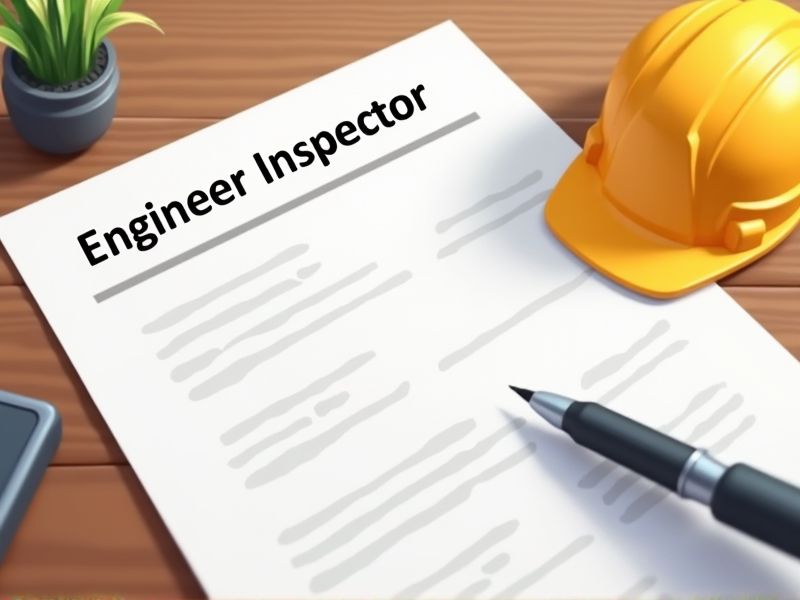
Engineer Inspectors face complex technical challenges requiring specialized knowledge and skills. Certain certifications validate their expertise and ensure adherence to industry regulations and safety standards. These credentials enhance an inspector's credibility and can lead to greater career opportunities. Here are some important certifications you may need as an Engineer Inspector.
Professional Engineer (PE) License
A Professional Engineer (PE) License ensures that an Engineer Inspector possesses the requisite technical expertise and understands engineering practices deeply, resulting in improved decision-making during inspections. Regulation and compliance standards demand PE licensure to maintain public safety and infrastructure integrity, so inspectors are required to hold this credential. Trust and credibility with clients and stakeholders are enhanced by holding a PE License, impacting project outcomes positively through increased confidence in the inspector's abilities. Legal liability issues are minimized for both the inspector and their employer since licensure signifies adherence to industry standards and ethics.
Certified Engineering Inspector (CEI)
A Certified Engineering Inspector (CEI) provides a standardized level of knowledge and expertise essential for maintaining consistency in engineering inspection processes. The certification ensures that inspectors are equipped with up-to-date methodologies and protocols, reducing the likelihood of errors and increasing safety. Clients and stakeholders gain confidence in project outcomes because CEIs adhere to industry standards and ethical guidelines. Certification often leads to improved efficiency and effectiveness, because certified professionals are trained to identify potential issues early in the process, mitigating costly interventions.
Certified Welding Inspector (CWI)
Certified Welding Inspectors (CWI) provide a specialized understanding of welding processes, ensuring that all structural components meet safety standards. Engineers rely on CWIs to verify weld quality, as this directly affects the integrity and longevity of structures. CWIs offer expertise in identifying potential weld defects that engineers may overlook, contributing to reduced risks of structural failures. The collaboration between engineers and CWIs enhances project reliability, safeguarding against costly repairs and maintaining compliance with industry regulations.
Certified Quality Inspector (CQI)
A Certified Quality Inspector (CQI) enhances an Engineer Inspector's ability to ensure product compliance with industry standards due to formal training in inspection techniques. Having a CQI allows an engineer to identify and address defects more effectively, reducing the likelihood of costly rework and project delays. The CQI certification instills a standardized approach to quality which supports consistent product evaluation across different sectors. With the growing complexity of manufacturing processes, a formal certification like CQI is crucial in maintaining industry credibility and meeting regulatory requirements.
NICET Certification
NICET Certification provides a standardized measure of competency and skills for engineering inspectors, ensuring uniformity in project assessments. Obtaining this certification often results in greater job opportunities and career advancement due to the recognized professional credibility it offers. Employers and clients are more likely to trust inspectors with this certification, leading to increased project bids and collaborations. The certification process involves rigorous testing and experience requirements, which confirms that inspectors possess a high level of expertise and dedication to their field.
Certified Safety Professional (CSP)
A Certified Safety Professional (CSP) credential enhances an engineer inspector's credibility by validating their expertise in safety standards and practices. This certification leads to more thorough safety assessments and hazard identifications, which enhances workplace safety compliance. Employers often prefer or require CSP-certified professionals, thus broadening career opportunities and potential for career advancement. Furthermore, CSPs typically command higher salaries due to their specialized knowledge and skills, financially benefiting the professional.
NACE Coating Inspector Program (CIP)
The NACE Coating Inspector Program (CIP) provides engineers with specialized knowledge to effectively assess and maintain corrosion protection systems. Engineers who complete the CIP gain advanced skills that enhance safety and longevity of industrial structures by identifying and mitigating potential coatings failures. By adhering to standardized inspection practices learned through the CIP, engineers ensure regulatory compliance and industry-standard quality. Having CIP certification also elevates an engineer's professional credibility, fostering trust among clients and employers.
ICC Building Inspector Certification
Obtaining an ICC Building Inspector Certification validates an engineer inspector's proficiency in understanding building codes and standards. This certification leads to enhanced credibility and trust among peers and clients, ensuring compliance with safety standards. It directly impacts the quality and consistency of inspections, potentially reducing construction-related risks. Many jurisdictions require this certification, influencing job opportunities and career advancement for the professionals.
OSHA 30-Hour Construction Safety Certification
Engineer Inspectors require OSHA 30-Hour Construction Safety Certification to ensure they understand and can mitigate job site hazards effectively. The certification equips them with comprehensive knowledge of safety standards and regulations, which reduces the risk of construction-related accidents. Acquiring this credential enhances the inspector's credibility and demonstrates a commitment to maintaining a safe work environment. It allows engineers to align with industry compliance standards, preventing potential legal issues related to safety violations.
ISO 9001 Lead Auditor Certification
ISO 9001 Lead Auditor Certification equips an Engineer Inspector with the skills to evaluate and improve quality management systems effectively. By holding this certification, they gain credibility and recognition in their field, which can open up more career opportunities. The training provides a structured approach to identifying non-conformities, leading to more consistent product quality. Certification encourages continuous personal development and keeps the inspector updated on international standards and best practices.
Summary
By obtaining certifications, you can significantly enhance your credibility as an Engineer Inspector, leading to increased trust from clients and employers. Certifications often result in better job opportunities and potential salary increments, as they demonstrate a commitment to continuous professional development. Your ability to conduct thorough and reliable inspections might improve, reducing the likelihood of oversight and increasing safety compliance. This professional development could also expand your network, connecting you with other certified professionals and industry leaders.
